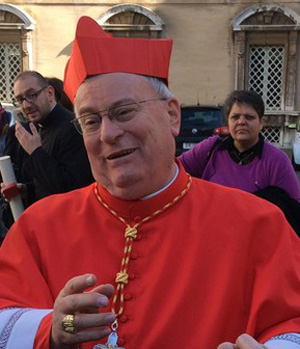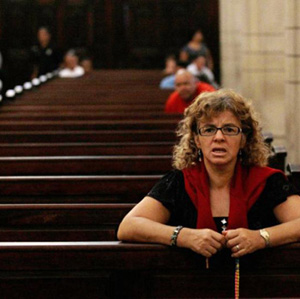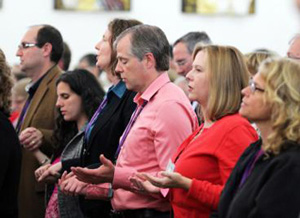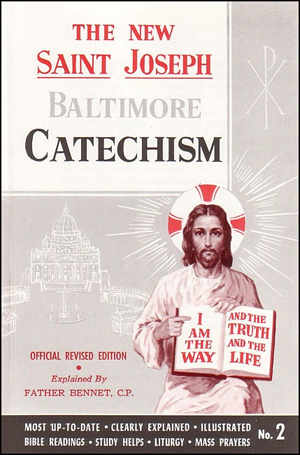Faith under Attack
 |
 |
 |
 |
 |
 |
 |
No ‘Springtime’ for Catholic Families
In an essay published on the front page of L’Osservatore Romano, Card. Gualtiero Bassetti of Perugia said that Pope Francis’ trip to Latin America marks “a new season, an authentic springtime” for the Church. This season, he noted, is taking place in nations at the “peripheries.”
 The Cardinal had the courage to pretend that in this supposed “springtime” we are seeing “the strengthening of the family” along with the normal One World Order goals the Vatican has embraced since Vatican II: the defense of human rights, the denunciation of Capitalism, etc.
The Cardinal had the courage to pretend that in this supposed “springtime” we are seeing “the strengthening of the family” along with the normal One World Order goals the Vatican has embraced since Vatican II: the defense of human rights, the denunciation of Capitalism, etc.
Now, what family is Card. Bassetti referring to in his blasé exhausted statement? Surely it is not the Catholic family. Never have statistics been so bleak on the state of the Catholic family in America and around the world. We refer here not just to the rising statistics on Catholics who are divorced, unwed mothers, cohabitating and proponents, but also to participants of homosexual “marriage.”
Further, inside the Catholic family there is abysmal ignorance about the Catholic Faith and a shameful lack of practices of the Sacraments.
This is confirmed by a new study on the Catholic Family by Dr. Mark Gray of Holy Cross Family Ministries released by the Center for Applied Research in the Apostolate at Georgetown University. The results are very far from representing a “springtime” for the Catholic family and the Church.
Mass, Sacraments & ‘core beliefs’
The polled parents all identify themselves as Catholics, yet only 25% say they attend Mass weekly. Fifty percent of the parents report attending Mass at least once a month.
More than 34% of Catholic parents do not think it is important for their children to make their First Communion, and a larger number (almost 40%) are unconcerned about Confirmation.
More than 68% of parents do not have any of their children enrolled in Catholic religious education of any sort. Although this looks ominous, it may be irrelevant since it is social teaching, not Catholic doctrine, that is being taught in most of these classes.
 Are Catholic children learning that missing Mass on Sunday is a mortal sin? Probably not, since this Commandment of the Church is no longer being taught in catechisms or preached from pulpits since Vatican II.
Are Catholic children learning that missing Mass on Sunday is a mortal sin? Probably not, since this Commandment of the Church is no longer being taught in catechisms or preached from pulpits since Vatican II.
As for other “core Creed beliefs,” as the survey calls them, what are Catholics parents believing? Better said, what are they rejecting?
Catholics praying more like Protestants
As for prayer, Catholics parents in general still pray at times, the study shows, but their prayer life and habits look more like those of Protestants.
 Most parents are “talking” to God personally rather than saying traditional prayers. Only 33% of Catholic parents pray daily, and about 25% say they pray once a week, 20% of them pray at least once a month, 12% pray a few times a year and 9% never pray. These are bleak numbers.
Most parents are “talking” to God personally rather than saying traditional prayers. Only 33% of Catholic parents pray daily, and about 25% say they pray once a week, 20% of them pray at least once a month, 12% pray a few times a year and 9% never pray. These are bleak numbers.
And how do those who pray, actually pray? Seventy five percent of parents say they pray by themselves “talking” to God rather than with family members.
How many pray the Rosary? Only 16% pray the Rosary at least once a month; 7% percent at least once a week. The most common reasons for not saying it: “It's not meaningful,” “It's old fashioned,” “I don't know how to do it.”
The most common reason given by parents (80%) for prayer is the well-being of their family. It is the same self-interest professed by Protestants. Only 15% say they use standard religious devotional prayers while praying.
Conclusion
It is the obligation of Catholic parents to raise their children as Catholics, which necessarily involves teaching them Catholic doctrine and prayers. Yet a majority of 21st century Catholic parents only assist at Mass at least once a month. Most are not teaching their children the tenets of the Faith or praying with their children. When they pray, they usually don't say traditional Catholic prayers.
Many admit to being indifferent about children receiving First Communion or Confirmation. How many children will leave the Faith or be serious about it if they don't even have First Communion or become confirmed?
This study, appropriately subtitled Challenges for the Church of the 21st Century, reveals the secondary or non-existent role attributed to the Faith in Catholic family life today.
Is this what the Vatican is calling an “authentic springtime” for the Church?
What isn't being taught to Catholics today
Here is a sample from Baltimore Catechism n. 2 on the Commandments of the Church:
282. What sin does a Catholic commit who through his own fault misses Mass on a Sunday or holyday of obligation?
 A Catholic who through his own fault misses Mass on a Sunday or holyday of obligation commits a mortal sin.
A Catholic who through his own fault misses Mass on a Sunday or holyday of obligation commits a mortal sin.
Keep you My Sabbath; for it is holy unto you (Ex 31:14).
66. What is mortal sin?
Mortal sin is a grievous offense against the law of God.
Flee from sins as from the face of a serpent; for if thou comest near them, they will take hold of thee (Eccles 21:2).
67. Why is this sin called mortal?
This sin is called mortal, or deadly, because it deprives the sinner of sanctifying grace, the supernatural life of the soul.
Before man is life and death, good and evil; that which he shall choose shall be given him. (Eccles 15:18)
68. Besides depriving the sinner of sanctifying grace, what else does mortal sin do to the soul?
Besides depriving the sinner of sanctifying grace, mortal sin makes the soul an enemy of God, takes away the merit of all its good actions, deprives it of the right to everlasting happiness in Heaven, and makes it deserving of everlasting punishment in Hell.
For the wages of sin is death; but the grace of God, life everlasting in Christ Jesus our Lord (Rom 6:23).

Posted July 17, 2015

Card. Bassetti unrealistically assures us of a new springtime for the Church & family
Now, what family is Card. Bassetti referring to in his blasé exhausted statement? Surely it is not the Catholic family. Never have statistics been so bleak on the state of the Catholic family in America and around the world. We refer here not just to the rising statistics on Catholics who are divorced, unwed mothers, cohabitating and proponents, but also to participants of homosexual “marriage.”
Further, inside the Catholic family there is abysmal ignorance about the Catholic Faith and a shameful lack of practices of the Sacraments.
This is confirmed by a new study on the Catholic Family by Dr. Mark Gray of Holy Cross Family Ministries released by the Center for Applied Research in the Apostolate at Georgetown University. The results are very far from representing a “springtime” for the Catholic family and the Church.
Mass, Sacraments & ‘core beliefs’
The polled parents all identify themselves as Catholics, yet only 25% say they attend Mass weekly. Fifty percent of the parents report attending Mass at least once a month.
More than 34% of Catholic parents do not think it is important for their children to make their First Communion, and a larger number (almost 40%) are unconcerned about Confirmation.
More than 68% of parents do not have any of their children enrolled in Catholic religious education of any sort. Although this looks ominous, it may be irrelevant since it is social teaching, not Catholic doctrine, that is being taught in most of these classes.

Only 7 % of Catholic parents pray the Rosary once a week
As for other “core Creed beliefs,” as the survey calls them, what are Catholics parents believing? Better said, what are they rejecting?
- 15 % do not agree there is a Heaven;
- 18% doubt the Trinity, and the same for the existence of Angels;
- 21% do not hold that God is Creator of the universe, that humans were made in the image of God, and that prayers are heard and answered.
- 25% do not believe in the Final Judgment, that Mary was conceived without original sin or there is a Devil;
- 29 % doubt there is a Hell.
Catholics praying more like Protestants
As for prayer, Catholics parents in general still pray at times, the study shows, but their prayer life and habits look more like those of Protestants.

Vatican II Catholics praying look more & more like Protestants
And how do those who pray, actually pray? Seventy five percent of parents say they pray by themselves “talking” to God rather than with family members.
How many pray the Rosary? Only 16% pray the Rosary at least once a month; 7% percent at least once a week. The most common reasons for not saying it: “It's not meaningful,” “It's old fashioned,” “I don't know how to do it.”
The most common reason given by parents (80%) for prayer is the well-being of their family. It is the same self-interest professed by Protestants. Only 15% say they use standard religious devotional prayers while praying.
Conclusion
It is the obligation of Catholic parents to raise their children as Catholics, which necessarily involves teaching them Catholic doctrine and prayers. Yet a majority of 21st century Catholic parents only assist at Mass at least once a month. Most are not teaching their children the tenets of the Faith or praying with their children. When they pray, they usually don't say traditional Catholic prayers.
Many admit to being indifferent about children receiving First Communion or Confirmation. How many children will leave the Faith or be serious about it if they don't even have First Communion or become confirmed?
This study, appropriately subtitled Challenges for the Church of the 21st Century, reveals the secondary or non-existent role attributed to the Faith in Catholic family life today.
Is this what the Vatican is calling an “authentic springtime” for the Church?
What isn't being taught to Catholics today
Here is a sample from Baltimore Catechism n. 2 on the Commandments of the Church:
282. What sin does a Catholic commit who through his own fault misses Mass on a Sunday or holyday of obligation?

Absent from today's family catechesis...
Keep you My Sabbath; for it is holy unto you (Ex 31:14).
66. What is mortal sin?
Mortal sin is a grievous offense against the law of God.
Flee from sins as from the face of a serpent; for if thou comest near them, they will take hold of thee (Eccles 21:2).
67. Why is this sin called mortal?
This sin is called mortal, or deadly, because it deprives the sinner of sanctifying grace, the supernatural life of the soul.
Before man is life and death, good and evil; that which he shall choose shall be given him. (Eccles 15:18)
68. Besides depriving the sinner of sanctifying grace, what else does mortal sin do to the soul?
Besides depriving the sinner of sanctifying grace, mortal sin makes the soul an enemy of God, takes away the merit of all its good actions, deprives it of the right to everlasting happiness in Heaven, and makes it deserving of everlasting punishment in Hell.
For the wages of sin is death; but the grace of God, life everlasting in Christ Jesus our Lord (Rom 6:23).

Posted July 17, 2015
______________________
______________________





